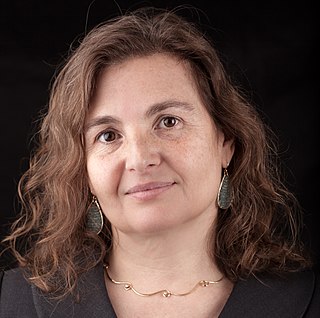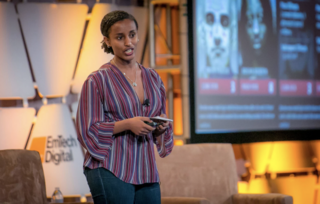Related Research Articles

Barbara Liskov is an American computer scientist who has made pioneering contributions to programming languages and distributed computing. Her notable work includes the development of the Liskov substitution principle which describes the fundamental nature of data abstraction, and is used in type theory and in object-oriented programming. Her work was recognized with the 2008 Turing Award, the highest distinction in computer science.

Daphne Koller is an Israeli-American computer scientist. She was a professor in the department of computer science at Stanford University and a MacArthur Foundation fellowship recipient. She is one of the founders of Coursera, an online education platform. Her general research area is artificial intelligence and its applications in the biomedical sciences. Koller was featured in a 2004 article by MIT Technology Review titled "10 Emerging Technologies That Will Change Your World" concerning the topic of Bayesian machine learning.

The President's Council of Advisors on Science and Technology (PCAST) is a council, chartered in each administration with a broad mandate to advise the president of the United States on science and technology. The current PCAST was established by Executive Order 13226 on September 30, 2001, by George W. Bush, was re-chartered by Barack Obama's April 21, 2010, Executive Order 13539, by Donald Trump's October 22, 2019, Executive Order 13895, and by Joe Biden's February 1, 2021, Executive Order 14007.
Stefan Savage is an American computer science researcher, currently a Professor in the Systems and Networking Group at the University of California, San Diego. There, he holds the Irwin and Joan Jacobs Chair in Information and Computer Science. Savage is widely cited in computer security, particularly in the areas of email spam, network worms and malware propagation, distributed denial of service (DDOS) mitigation and traceback, automotive hacking and wireless security. He received his undergraduate degree at Carnegie Mellon and his Ph.D. from the University of Washington.

Daniela L. Rus is a roboticist and computer scientist, Director of the MIT Computer Science and Artificial Intelligence Laboratory (CSAIL), and the Andrew and Erna Viterbi Professor in the Department of Electrical Engineering and Computer Science (EECS) at the Massachusetts Institute of Technology.
Daniel Alan Spielman has been a professor of applied mathematics and computer science at Yale University since 2006. As of 2018, he is the Sterling Professor of Computer Science at Yale. He is also the Co-Director of the Yale Institute for Network Science, since its founding, and chair of the newly established Department of Statistics and Data Science.

Nadarajan "Raj" Chetty is an Indian-American economist and the William A. Ackman Professor of Public Economics at Harvard University. Some of Chetty's recent papers have studied equality of opportunity in the United States and the long-term impact of teachers on students' performance. Offered tenure at the age of 28, Chetty became one of the youngest tenured faculty in the history of Harvard's economics department. He is a recipient of the John Bates Clark Medal and a 2012 MacArthur Fellow. Currently, he is also an advisory editor of the Journal of Public Economics. In 2020, he was awarded the Infosys Prize in Economics, the highest monetary award recognizing achievements in science and research, in India.
Maneesh Agrawala is a professor of computer science at Stanford University. He returned to Stanford in 2015 as the director of the Brown Institute for Media Innovation, after nearly a decade on the faculty at the University of California, Berkeley.
Subhash Khot is an Indian-American mathematician and theoretical computer scientist who is the Julius Silver Professor of Computer Science in the Courant Institute of Mathematical Sciences at New York University. Khot has contributed to the field of computational complexity, and is best known for his unique games conjecture.

Jitendra Malik is an Indian-American academic who is the Arthur J. Chick Professor of Electrical Engineering and Computer Sciences at the University of California, Berkeley. He is known for his research in computer vision.
Dawn Song is a Chinese American academic and is a professor at the University of California, Berkeley, in the Electrical Engineering and Computer Science Department.

Shwetak Naran Patel is an American computer scientist and entrepreneur best known for his work on developing novel sensing solutions and ubiquitous computing. He is the Washington Research Foundation Entrepreneurship Endowed Professor at the University of Washington in Computer Science & Engineering and Electrical Engineering, where he joined in 2008. His technology start-up company on energy sensing, Zensi, was acquired by Belkin International, Inc. in 2010. He was named a 2011 MacArthur Fellow. In 2016, He was elected as an ACM Fellow for contributions to sustainability sensing, low-power wireless sensing and mobile health and received Presidential Early Career Award for Scientists and Engineers (PECASE). He was named the recipient of the 2018 ACM Prize in Computing for contributions to creative and practical sensing systems for sustainability and health.

Dina Katabi is the Andrew and Erna Viterbi Professor of Electrical Engineering and Computer Science at MIT and the director of the MIT Wireless Center.

The Association for Computing Machinery's Council on Women in Computing (ACM-W) supports, celebrates, and advocates internationally for the full engagement of women in all aspects of the computing field, providing a wide range of programs and services to ACM members and working in the larger community to advance the contributions of technical women. ACM-W is an active organization with over 36,000 members.
Regina Barzilay is an Israeli-American computer scientist. She is a professor at the Massachusetts Institute of Technology and a faculty lead for artificial intelligence at the MIT Jameel Clinic. Her research interests are in natural language processing and applications of deep learning to chemistry and oncology.
Monika Schleier-Smith is an American experimental physicist studying many-body quantum physics by precisely assembling systems of ultracold atoms. These atomic, molecular, and optical physics (AMO) engineered systems have applications in quantum sensing, coherent control, and quantum computing. Schleier-Smith is an Associate Professor of Physics at Stanford University, a Sloan Research Fellow, and a National Science Foundation CAREER Award recipient. Schleier-Smith also serves on the board of directors for the Hertz Foundation.

Rediet Abebe is an Ethiopian computer scientist working in algorithms and artificial intelligence. She is an assistant professor of computer science at the University of California, Berkeley. Previously, she was a Junior Fellow at the Harvard Society of Fellows.
Himabindu "Hima" Lakkaraju is an Indian-American computer scientist who works on machine learning, artificial intelligence, algorithmic bias, and AI accountability. She is currently an Assistant Professor at the Harvard Business School and is also affiliated with the Department of Computer Science at Harvard University. Lakkaraju is known for her work on explainable machine learning. More broadly, her research focuses on developing machine learning models and algorithms that are interpretable, transparent, fair, and reliable. She also investigates the practical and ethical implications of deploying machine learning models in domains involving high-stakes decisions such as healthcare, criminal justice, business, and education. Lakkaraju was named as one of the world's top Innovators Under 35 by both Vanity Fair and the MIT Technology Review.
References
- 1 2 Mathur, Nandita (2016-09-23). "Microsoft Research India's Bill Thies awarded prestigious MacArthur Fellowship". Livemint. Retrieved 2020-05-21.
- ↑ "Bill Thies - MacArthur Foundation". www.macfound.org. Retrieved 2020-05-21.
- 1 2 "Microsoft researcher Bill Thies wins MacArthur grant". The Seattle Times. 2016-09-22. Retrieved 2020-05-21.
- ↑ "Bill Thies awarded 2016 MacArthur Fellowship | MIT EECS". www.eecs.mit.edu. Retrieved 2020-05-21.
- ↑ "Pennsylvania man named a 2016 MacArthur 'genius' grant winner". pennlive. 2016-09-22. Retrieved 2020-05-21.
- ↑ Falce, Lori (May 21, 2020). "Real genius: State High grad nets MacArthur Fellowship". Centre Daily.
- ↑ "bnid.org". www.bnid.org. Retrieved 2020-05-21.
- ↑ "Subhash Khot and Bill Thies named 2016 MacArthur Fellows". www.acm.org. Retrieved 2020-05-21.
This article needs additional or more specific categories .(July 2020) |